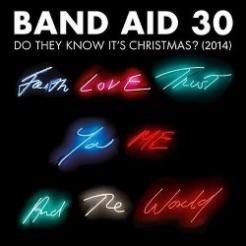Kirsty Weakley wonders if it is time for Band Aid to hang up their microphones or if there is still a place in the fundraising landscape for a 30-year-old charity song?
The year 1984 is a long time ago; Western economies were struggling to recover from a recession, patterned leggings were the height of fashion, Apple had just launched a new gadget with its customary fanfare, and when a few pop stars made a record to raise money to help people suffering in Africa they were duly applauded, one million copies were bought in the first week and Sir Bob Geldof was transformed from a scruffy punk rock star to activist, philanthropist and campaigner.
I wasn’t actually around in 1984 but I’m assuming that the fact that the effort was repeated in 1989, 2004 and now in 2014 means the reception to the original was broadly positive. It’s clear from the footage of them performing on Top of the Pops how passionate they all were about the message.
Criticism of the lyrics
So why then has there been such a discernible backlash this time around, and what does this mean for the charity sector?
Is it simply that the world is now much more connected – both physically and digitally, making it easier and quicker for people to share their opinions? A cursory glance at the comments sections on news websites makes it abundantly clear that everything is now open to harsh and unrelenting criticism whether it is justified or not.
Or has something fundamental changed about the way the public views Africa and the role that Western charities have to play in the continent, that has made the sentiments expressed by Band Aid 30 seem outdated and patronising?
The rapper Fuse ODG turned down the invite to take part over his concerns that the lyrics portrayed a damaging stereotype of the whole of Africa. Emeli Sande has since revealed that she recorded alternative lyrics that were not used on the final version, and has called for the whole song to be rewritten.
This is not the first time that the initiative has been criticised, but that criticism in the mainstream press has tended to focus on the musical talent, or lack thereof, of those taking part rather than the lyrics.
Yet in 2004 the World Development Movement criticised the lyrics in 2004 as “patronising, false and out of date” and its supporters suggested a selection of new lyrics. Should those behind Band Aid have listened? Or did they feel the criticism was too isolated, and outweighed by the money raised, for it to be a problem?
Making less than before
Each download of Band Aid 30 is raising a quarter of what each physical copy was sold for 30 years ago; 99p for the download compared to £4 for the single in 1984. Those sorts of numbers don’t seem to make fundraising sense. The physical copy will be out in December – but will it be too late? Lily Allen called the record “smug” and said she preferred to donate “actual money”.
Bob Geldof himself has expressed concern that this year’s effort might suffer and has urged people to delete and re-download the song (this won’t work for iTunes as people’s accounts save deleted songs on the iCloud) and Band Aid has introduced a text donate line.
Band Aid Trust as a longer-term grantmaker
With all these concerns, both about the content of the song and its ability to fundraise why have we heard comparatively little criticism from the sector?
Could it be because even in years when there was no cover song or live event the Band Aid Trust had an income of around £500,000, the majority of which comes from record and video royalties, and makes grants to organisations like ActionAid, Save the Children and War Child.
Band Aid is not just a series of disjoined events. The royalties income means there is a steady flow of money into the charity. Accounts show that in the last six years it has given more than £10m in grants. That’s not money to be sniffed at.
Charities cannot ignore the fact that the attempt is likely to raise millions, which will be used to support organisations fighting Ebola in parts of Africa. And it would certainly seem ungrateful to judge a group of well-meaning pop stars for not being up-to-date on how they speak about poverty.
I hope that this will be the last version of ‘Do they know it’s Christmas’ we will hear. But I also hope that it’s not the end of the Band Aid Trust. The willingness of pop stars to take part and their ability to inspire their legions of devoted fans to buy something for charity – that’s powerful and shouldn’t be thrown away.
It’s time for Geldof and co to pass the creative baton onto the next generation, but keep the Band Aid brand and the charity running. They should use all that they have learned from the last 30 years of making and raising money for charity to support artists such as Fuse ODG and Emeli Sande to write completely new fundraising songs that come from the heart.










